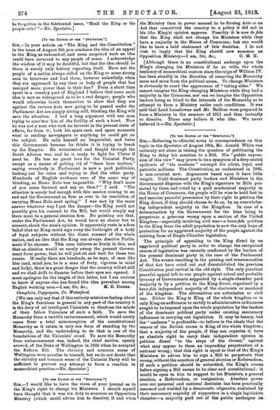[To THE EDITOR 07 VIZ " EPICTIT011."1 Sin,—Referring to editorial
notes to correspondence on this topic in the Spectator of August 16th, Mr. Arnold White was certainly not alone in raising the question of petitioning the King to delay his sanction to a Bill. His "public expres- sion of this view" may prove to be a symptom of a deep-seated epidemic of "his madness" amongst the silent, loyal, and patriotic millions. The Constitution, as understood in 1906, is non-existent now. Arguments based upon it have little weight. Until dominant party leaders and Ministers in the Government dispense with the King's signature to Bills pro- moted by them arid voted by a paid mechanical majority in the House of Commons, the people will be wise to hold fast to and exercise peaceful persuasion by their right to petition the King direct, if they should choose to do so, by an overwhelm- ing independent majority in the Kingdom. In case of a, determination by the Government for the time being to perpetrate a grievous wrong upon a section of the United Kingdom—especially involving civil war—a bona-fide petition to the King from the adult population is now the only hope of protection for an aggrieved majority of the people against the existing form of Single-Chamber legislation.
The principle of appealing to the King direct by an aggrieved political party in order to change the recognized course of legislation was recently confirmed by the leaders of the present dominant party in the case of the Parliament Act. The events resulting in the passing and consummation of that Act have ruled out and disestablished the previous Constitution past revival in the old style. The only practical peaceful appeal left to our people against actual and probable tyranny of Governments supported by a single-chamber paid majority is by a petition to the King direct, organized by a bona-fide independent majority of the electorate or manhood of the kingdom. The alternatives are submission or civil war. Either the King is King of the whole kingdom or is only King on sufferance to certify to administrative ordinances sought to be imposed upon the whole population by the leaders of the dominant political party under existing mercenary influences in carrying out legislation. It may be lunacy, but the " madness " is preferable—to believe in the ideals that the wearer of the British crown is King of the whole kingdom ; that a majority of the people, if they can organise it, have an absolute right to carry their independent opinion in petition direct "to the steps of the throne," against what may appear to them an impending perpetration of a national wrong ; that this right is equal to that of the King's Ministers to advise him to sign a Bill to perpetrate that wrong, without the sanction of general election or Referendum. If such a petition should be submitted, the King's course before signing a Bill seems to be clear and constitutional : it would be open to him to suggest to his Ministers, a general election, a Referendum, or resignation. Absolute power Over our personal and national destinies has been practically assumed and wielded by a democratic oligarchy, sustained by their mercenary majority of supporters in a single legislative chamber—a majority paid out of the public. exchequer on. their own vote at the instance of the very Ministers in power. A cynical outrage upon the root principle against undue "influence" and " bribery " of voters, as defined in the first section and third schedule of the Corrupt and Illegal Practices Prevention Act 1883, and penalized by that Act.— [We cannot admit that any comparison is possible between an appeal to the King made by the Ministers in power and the unofficial appeal which it has been proposed should be made now by members of the party which is not in power. The King listened to the appeal or advice of his Ministers as to the creation of Peers in the event of the House of Lords throwing out the Parliament Bill. A wise and cool constitutional Sovereign who recognizes that he must act automatically could not have behaved otherwise.—ED. Spectator.]







































 Previous page
Previous page